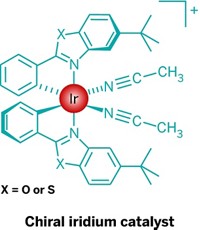Advertisement
Grab your lab coat. Let's get started
Welcome!
Welcome!
Create an account below to get 6 C&EN articles per month, receive newsletters and more - all free.
It seems this is your first time logging in online. Please enter the following information to continue.
As an ACS member you automatically get access to this site. All we need is few more details to create your reading experience.
Not you? Sign in with a different account.
Not you? Sign in with a different account.
ERROR 1
ERROR 1
ERROR 2
ERROR 2
ERROR 2
ERROR 2
ERROR 2
Password and Confirm password must match.
If you have an ACS member number, please enter it here so we can link this account to your membership. (optional)
ERROR 2
ACS values your privacy. By submitting your information, you are gaining access to C&EN and subscribing to our weekly newsletter. We use the information you provide to make your reading experience better, and we will never sell your data to third party members.
Synthesis
Gold catalysis with less fuss
Researchers develop a general approach to arylgold(III) complexes that may lead to new gold-catalyzed reactions
by Stephen K. Ritter
April 18, 2016
| A version of this story appeared in
Volume 94, Issue 16
In an advance that simplifies gold redox catalysis, a research team led by A. Stephen K. Hashmi of Heidelberg University, in Germany, has discovered a means for carrying out visible-light-mediated reactions without the need for an auxiliary oxidant or a ruthenium or iridium photosensitizer. The additional reagents are typically needed to promote oxidation of gold(I) to gold(III) as part of the catalytic cycle. The Hashmi group determined that a phosphine gold(I) chloride catalyst can function as its own photosensitizer when irradiated with visible light. When paired with an aryldiazonium salt, the gold(I) species is oxidized to a gold(III) species that can complete the difunctionalization of alkynes to make α-aryl ketones (Angew. Chem. Int. Ed. 2016, DOI: 10.1002/anie.201511487). What’s more, by using a P,N-bidentate ligand, the researchers were able to isolate and obtain the X-ray crystal structure of the gold(III) species (shown above). Chemists have debated whether gold(III) intermediates are involved given gold’s high oxidation potential. The Heidelberg group’s effort provides the first direct evidence to satisfy that curiosity, and further studies show that the group’s approach is a general method for generating arylgold(III) complexes (Chem. Commun. 2016, DOI: 10.1039/c6cc02199a).





Join the conversation
Contact the reporter
Submit a Letter to the Editor for publication
Engage with us on Twitter